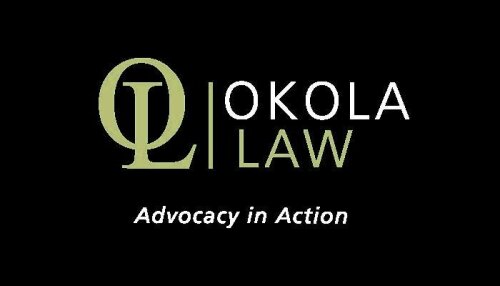Best Retirement Lawyers in Toronto
Share your needs with us, get contacted by law firms.
Free. Takes 2 min.
List of the best lawyers in Toronto, Canada
About Retirement Law in Toronto, Canada
Retirement law in Toronto, Canada governs the rights and responsibilities of individuals when they retire from the workforce. It covers aspects such as pensions, benefits, retirement planning, and estate planning. Understanding the legal implications of retirement is crucial to ensure a smooth transition into this phase of life.
Why You May Need a Lawyer
There are several situations where you may require legal assistance in retirement, such as disputes over pension benefits, drafting or updating your will, navigating tax implications of retirement income, or challenging decisions made by your retirement plan administrator. A lawyer with expertise in retirement law can provide valuable guidance and representation to protect your interests.
Local Laws Overview
In Toronto, Canada, retirement laws are governed by federal and provincial legislation, including the Canada Pension Plan, Employment Standards Act, and various tax laws. These laws outline the rights and obligations of retirees, employers, and pension providers, ensuring fairness and transparency in retirement matters.
Frequently Asked Questions
1. Can my employer force me to retire at a certain age?
In most cases, employers are not allowed to mandate retirement based solely on age. However, there are exceptions for certain occupations where age limits are justified for safety or performance reasons.
2. How can I challenge a denial of my pension benefits?
If your pension benefits have been denied, you can appeal the decision through internal processes or seek legal recourse by filing a complaint with relevant authorities or initiating a lawsuit.
3. What should I consider when creating my retirement plan?
When creating a retirement plan, factors to consider include your desired retirement age, sources of income (pensions, savings, investments), lifestyle goals, healthcare needs, and estate planning considerations.
4. Are there tax implications to consider in retirement?
Yes, there are tax implications to consider in retirement, such as the taxation of pension income, withdrawals from retirement accounts, and estate taxes. Consulting with a tax advisor can help you navigate these complexities.
5. How can I ensure my estate is handled according to my wishes after I pass away?
To ensure your estate is handled according to your wishes, you should create a will or update an existing one, designate beneficiaries for retirement accounts, and consider setting up trusts or powers of attorney.
6. What are my rights if I believe my retirement plan administrator is not acting in my best interests?
If you suspect misconduct by your retirement plan administrator, you can file a complaint with regulatory bodies, seek legal advice to understand your rights, or take legal action if necessary.
7. Can I work part-time or freelance after retirement without affecting my pension benefits?
Working part-time or freelancing after retirement may impact your pension benefits depending on the type of pension plan you have. It's advisable to review your plan's rules and consult with a financial advisor to understand the implications.
8. How can I protect my retirement savings from market fluctuations?
To protect your retirement savings from market fluctuations, you can diversify your investments, review and adjust your risk tolerance as you near retirement, consider insurance products, or seek professional financial advice.
9. What are the options for long-term care planning in retirement?
Long-term care planning options in retirement include purchasing long-term care insurance, setting up a healthcare directive or power of attorney, exploring in-home care services, or considering assisted living facilities.
10. How can I maximize my retirement income to ensure financial security?
To maximize your retirement income, you can optimize your pension benefits, explore investment opportunities, implement a sustainable withdrawal strategy, consider downsizing your living expenses, and seek guidance from financial experts.
Additional Resources
For further information and resources on retirement law and planning in Toronto, Canada, you can refer to the following organizations and governmental bodies:
- Financial Consumer Agency of Canada
- Canada Revenue Agency
- Ontario Securities Commission
- Law Society of Ontario
Next Steps
If you require legal assistance or advice regarding retirement in Toronto, Canada, it's recommended to consult with a qualified lawyer specializing in retirement law. They can provide personalized guidance and representation to address your specific needs and protect your interests. Take proactive steps to secure your retirement future and ensure a smooth transition into this phase of life.
Lawzana helps you find the best lawyers and law firms in Toronto through a curated and pre-screened list of qualified legal professionals. Our platform offers rankings and detailed profiles of attorneys and law firms, allowing you to compare based on practice areas, including Retirement, experience, and client feedback.
Each profile includes a description of the firm's areas of practice, client reviews, team members and partners, year of establishment, spoken languages, office locations, contact information, social media presence, and any published articles or resources. Most firms on our platform speak English and are experienced in both local and international legal matters.
Get a quote from top-rated law firms in Toronto, Canada — quickly, securely, and without unnecessary hassle.
Disclaimer:
The information provided on this page is for general informational purposes only and does not constitute legal advice. While we strive to ensure the accuracy and relevance of the content, legal information may change over time, and interpretations of the law can vary. You should always consult with a qualified legal professional for advice specific to your situation.
We disclaim all liability for actions taken or not taken based on the content of this page. If you believe any information is incorrect or outdated, please contact us, and we will review and update it where appropriate.















